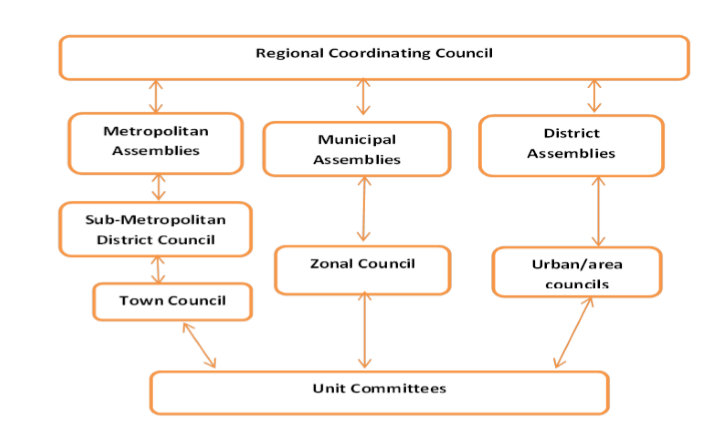FINANCIAL REPORTING IN THE LOCAL GOVERNMENT
Summary of Contents
DECENTRALIZATION IN GHANA
Welcome to session one of unit four. Let us look at Decentralization and the local government system in Ghana.
Objectives
at the end of this session, you should be able to:
- a) explain the concept of decentralization in Ghana.
- b) explain the structure of the local government system
Now read on…
RECOMMENDED READING: FINANCIAL REPORTING IN CENTRAL GOVERNMENT
Introduction Decentralization in Ghana
Article 240 of the Constitution provides for the establishment of a system of local government and administration which should be decentralized. The local government Act 1993, Act 462 was promulgated to ensure that the functions, powers responsibilities and resources are all times transferred from the central government to the local governments in a coordinated manner. The local government concept is what is termed the district assembly system in Ghana.
Concept of Decentralization in Ghana
Decentralization is a response to the challenges of centralized systems. Decentralization in government has been seen as a solution to problems like economic decline, government inability to fund services and their general decline in the performance of overloaded services.
Decentralization is the process by which the activities of an organization, particularly those regarding planning and decision-making are distributed or delegated away from a central, authoritative location or group.
Thus, it is the process of redistributing functions, powers, people or things away from a central location or authority. In government, decentralization refers to the transfer of power, responsibilities, functions and resources from the central government to the local people through the local authorities.
READ ALSO: PUBLIC SECTOR ACCOUNTING: REGULATORY FRAMEWORK OF BUDGETING IN GHANA
Decentralization, or decentralized governance, refers to the restructuring or reorganization of authority so that there is a system of co-responsibility between institutions of governance at the central, regional and local levels according to the principle of subsidiarity, thus increasing the overall quality and effectiveness of the system of governance while increasing the authority and capacities of sub-national levels.
Forms of Decentralization in Ghana
Decentralization can take many forms including, Political, administration, fiscal and economic. The following are a brief description of the forms of decentralization.
- Political decentralization in Ghana
aims to give citizens or their elected representatives more power. It involves giving citizens more influence in the formulation and implementation of laws and policies.
This process is accomplished by the institution of reforms that either delegate a certain degree of decision-making autonomy to the local authorities or grant citizens the right to elect lower-level officials, like local or regional representatives.
- Administrative decentralization in Ghana
involves giving the local people administrative powers to make a decision without recourse to the central government. There are three forms of administrative decentralisation:
- De-concentration: This is the weakest form of decentralization. It shifts responsibility for decision-making, finance and implementation of certain public functions from officials of central governments to those in existing districts or, if necessary, new ones under the direct control of the central government.
- Delegation: This form of administrative decentralization passes down responsibility for decision-making, finance and implementation of certain public functions to semi-autonomous organizations not wholly controlled by the central government, but ultimately accountable to it.
- Devolution: Transfers all responsibility for decision-making, finance and implementation of certain public functions to the sub-national level, such as a regional, local, or state government.
- Fiscal decentralization in Ghana
Fiscal decentralization means decentralizing revenue raising and or expenditure of money to a lower level of government while maintaining financial responsibility. Fiscal decentralization can be achieved through user fees, user participation through monetary or labour contributions, expansion of local property or sales taxes as well as intergovernmental transfers of central government tax revenue to local governments through transfer payments or grants, and authorization of municipal borrowing with national government loan guarantees.
4. Economic decentralization in Ghana
Economic decentralization is achieved through privatization of public-owned functions and businesses. It is also achieved through the abolition of restrictions on businesses competing with government services, for example, postal services, schools, garbage collection.
Reasons for Decentralization in Ghana
Decentralization as discussed above is a response to the problems of centralized systems. The following are some of the reasons for decentralizing decision-making and other relevant powers from the central government to the local government:
- a) Decentralization ensures a closer link with the people. Thus decentralization brings government closer to the people making government for the people by the people. This increased effectiveness of government policies at the local level.
- b) Decentralization ensures local participation in government decision making and democracy. Thus there is the tendency of the people to get involved in the election process directly by electing their representatives and their chief executives.
- c) Decentralization also improves efficiency and better services. Thus decentralization helps heighten accountability and transparency. This will lead to higher efficiency in service delivery resulting in better services at the local level
- d) Decentralization also improves revenue mobilization. This is because perceived better service increases the willingness of the people to pay local taxes and levies towards those services.
- e) It also leads to a reduction in cost to the central government. Increase in internally generated funds of the local governments will lead to a reduction in intergovernmental transfers and grants to the local governments.
Barriers to Decentralization in Ghana
Some of the factors that affect decentralization are as follows;
- a) Weak local administrative or technical capacity may result in inefficient or ineffective services
- b) Inadequate financial resources may be made available to perform new local responsibilities, especially in the start-up phase when they are most needed.
- c) Danger of complexity of national policy coordination
- d) Inequitable distribution of resources may result.
- e) Higher enforcement costs and conflicts for resources if there is no higher level of authority
- f) High cost of decentralization
- g) Possibility that corrupt local elites can capture regional or local power centres
Features of Local government in Ghana
In accordance with The 1992 constitution of Ghana, Article 240, the local government system in Ghana shall have the following features:
- a) Parliament shall enact appropriate laws to ensure that functions, powers, responsibilities and resources are at all times transferred from the Central Government to local government units in a coordinated manner;
- b) Parliament shall by law provide for the taking of such measures as are necessary to enhance the capacity of local government authorities to plan, initiate, coordinate, manage and execute policies in respect of all matters affecting the people within their areas, with a view to ultimately achieving localization of those activities;
- c) there shall be established for each local government unit a sound financial base with adequate and reliable sources of revenue;
- d) as far as practicable, persons in the service of local government shall be subject to the effective control of local authorities;
- e) to ensure the accountability of local government authorities, people in particular local government areas shall, as far as practicable, be afforded the opportunity to participate effectively in their governance.
Functions of Local Government in Ghana
A Local Government shall exercise political and administrative authority in the district, provide guidance, give direction to, and supervise the other administrative authorities within the district. For this purpose, the local government shall perform deliberative, legislative and executive functions. In accordance with section 10(3) of the Local Government Act 1993, Act 462, these functions are summarized as follows:
- a) The Local Government shall ensure the overall development of the district.
- b) Prepare and submit a development plan and budget for approval and implementation.
- c) Mobilize resources for the development of the district
- d) Ensure and Promote productive activity and social development and remove any obstacles to initiative and development
- e) Maintenance of security and public safety in the district
- f) Ensure ready access to the courts and public tribunals for the promotion of justice.
- g) Ensure the development of basic infrastructure in the district.
- h) Establishment, improvement and management of human settlements and the environment in the district.
- i) It is the function of the local government to levy and collect all taxes, rates, duties and fees to the appropriate fund.
Structure of the Local Government in Ghana
The local government system in Ghana is characterized by a four-tier structure which operates at the regional, district and sub-district levels. It consists of First Tier – Regional Coordinating Council; Second Tier – Metropolitan or Municipal or District Assemblies; Third Tier – Urban Town/Zonal/Area Councils and Fourth Tier – Unit Committees.

- Regional Coordinating Council
The Regional Coordinating Council (RCC) is the apex organization on the local government structure. It performs administrative and coordinating functions such as monitoring and evaluating the performance of the District Assemblies, monitoring the budget performance and the use of all monies allocated to the District Assemblies and coordinating district development plans and programmers.
Established in each of the 10 regions in Ghana, the RCC consists of the Regional Minister (chairman) and his deputies, the presiding member of the District Assembly and the District Chief Executive.
It also consists of two chiefs from the regional house of chiefs and the head of decentralized ministries without voting rights.
2. District Assembly
A District Assembly is a body corporate with perpetual succession and a common seal and may sue and be sued in its own name.
It has the power for the discharge of any of its functions to acquire and hold movable or immovable property, to dispose of such property and to enter into any contract or other transaction.
It is next after the Regional Coordinating Council with empowerment to be the pivot of local governance. Hello! Hope you are enjoying the lesson. Details of the district assembly will be discussed in our next session.
3. Sub District Structures
Tier 3: Sub-district structure is subordinate bodies of the District Assemblies. They are made up of the sub-metropolitan district council and urban or town/zonal/area councils.
The councils are to enumerate and keep records of all taxable persons and properties in the urban area, zone or town. They are also to recommend to the Assembly, the naming of all streets in its area of authority and all buildings to be numbered.
They are also responsible for assisting any authorized person by the District Assembly to collect revenues, preventing and controlling fire outbreaks and preparing annual budgets of revenue and recurrent as well as development budget of the urban or town council for the approval by the assemblies.
4. Unit Committees
At the bottom of the Local Government, Structure is the Unit Committees. It is established in a settlement with a population of between 500 to 1000 in the rural areas and 1500 for the urban areas.
Their main responsibility rests on enforcement and mobilization issues since they are closer to the people.
A unit committee is made up of not more than 15 persons; 10 of the members are elected from the residents in the unit and five other non-resident persons in the unit nominated by the district chief executive, acting on behalf of the president.
Unit committees are required to supervise the staff of the district assembly, assist the assembly in revenue collection, organize communal labour and voluntary work, educate the members in their rights, privileges and responsibilities and also monitor the implementation of development projects.
They are also to assist in enumerating and keeping records of all taxable persons and properties, make proposals to the Assembly regarding levying and collection of taxes and provide focal points for discussion of local matters with recommendations to the Assembly.
In Conclusion
we have discussed decentralization and the local government system in Ghana. We looked at the concept, forms, reasons and barriers of decentralization. We have also discussed the features and functions of the local government as well as the structure.
Self-Assessment Questions Exercise
- Explain the concept of decentralization
- State and explain Four forms of Decentralization.
- Outline Four (4) functions of the Local Government
- With the help of a diagram, explain the component of the Local Government Structure in Ghana.






Leave a comment